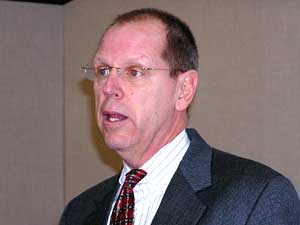January 26, 2005
 |
| Former finance commissioner Jay Kiedrowski criticizes Gov. Pawlenty's budget for relying on "gimmicks" to cover a $700 million deficit. (MPR Photo/Laura McCallum) |
St. Paul, Minn. — Less than a day after the governor released his budget proposal, the debate over its merits was in full swing. Former finance commissioners Jay Kiedrowski and John Gunyou were among the critics. They say the governor has turned to the wrong solutions for balancing the budget -- namely accounting gimmicks, gambling money and property tax increases.
Pawlenty wants to erase a projected $700 million deficit with a combination of spending cuts, money from a new casino and other revenues. Kiedrowski, a Democrat, singled out Pawlenty's plan to accelerate the collection of certain taxes.
For instance, sales taxes on auto leases would be paid up front rather than over the life of the lease. That, Kiedrowski says, constitutes a gimmick. He says Pawlenty's budget also presumes that school districts will raise property taxes.
"I think it's ironic that this conservative governor is for more financial gimmicks, more debt, more gambling and more property taxes. I was hoping we were going to see a better budget than this," says Kiedrowski.
Pawlenty says his budget proposal would put Minnesota in a position to be back on solid financial footing. During his budget release, Pawlenty said his budget wouldn't necessarily result in higher property taxes, it would simply allow school boards to raise local taxes without voter approval for certain education needs.
"We're not proposing that this all happens, or requiring that it all happens," said Pawlenty. "We are giving school districts an option -- if they want it -- to take it, and it is subject to reverse referendum by the voters."
Pawlenty says state tax revenues are slated to go up about 8 percent over the next two years. He says Minnesota remains one of the highest taxed states in the country and it doesn't need to raise taxes.
Both Kiedrowski and Gunyou recommend raising the state's cigarette tax by $1 per pack. Gunyou, a Republican, says that's a much better option than using gambling money to balance the budget.
"The governor is so irrationally committed to his 'no tax' pledge that he won't even reform our state's volatile tax system on a revenue-neutral basis," says Gunyou. "Minnesota has the most volatile tax system in the country. We need to fix it, and get off this fiscal roller coaster."
Gunyou notes this is the third straight year of budget deficits for the state. He blames political leaders who relied heavily on budget reserves and payment shifts to balance the budget two years ago.
Republican leaders paint a much rosier picture of the state's finances. Rep. Jim Knoblach, who chairs the House Ways and Means Committee, says the state has come a long way since the mammoth $4.5 billion deficit in 2003.
"Now we've got a billion dollars in reserves in the bank, we're a balanced budget for this year. If you look at the Pawlenty proposal, we've got structural surplus in the out years," says Knoblach.
That means that if Pawlenty's budget were enacted, it would result in budget surpluses in the 2008-2009 budget cycle. Kiedrowski disputes that. He says that's only if inflation isn't taken into account.
The House and Senate will soon begin holding budget hearings. Knoblach says the House Republican budget will likely be similar to Pawlenty's proposal, while DFL leaders say they have major concerns with the governor's budget.





